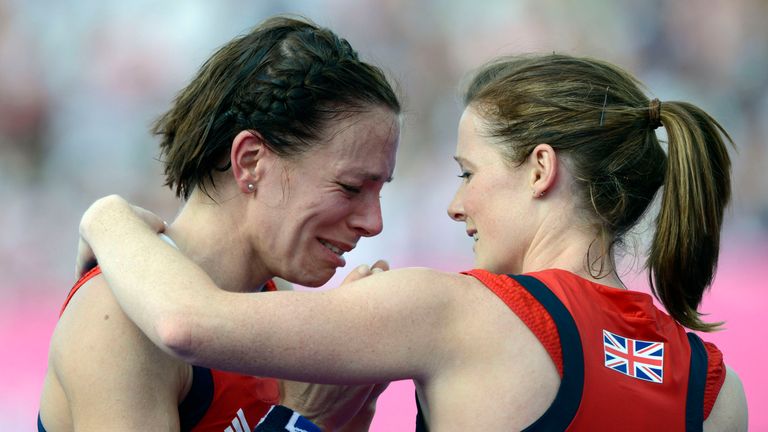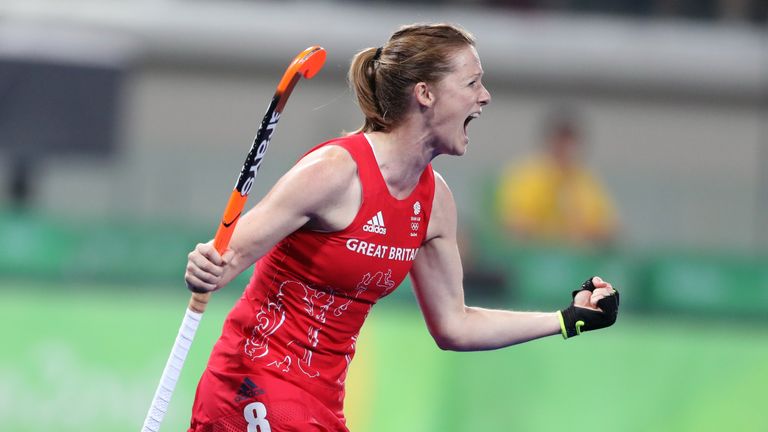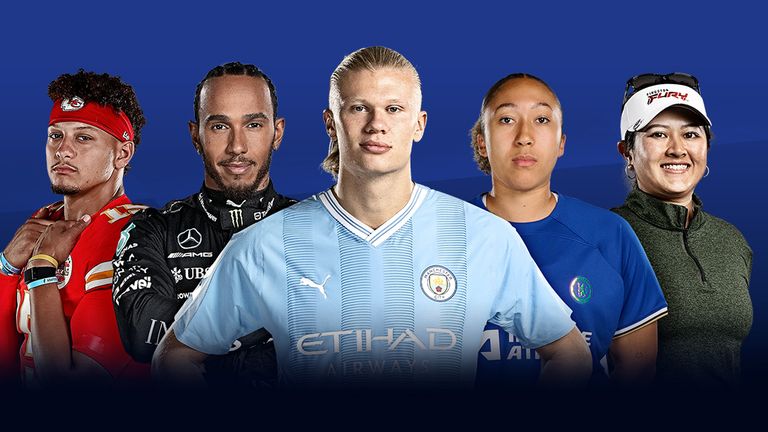Kate and Helen Richardson-Walsh on psychology, injury and Olympic gold
Former Great Britain and England hockey stars are the guests on new episode of the Will Greenwood Podcast

Wednesday 17 June 2020 06:09, UK
Kate and Helen Richardson-Walsh - the first-ever same-sex married couple to win Olympic gold - discuss psychology, the mental side of elite sport, injuries, disappointments and more on the road to Rio 2016 glory...
Hockey players for Great Britain and England, the couple racked up nearly 700 international caps between them from 1999 to 2016, and chatted to Sky Sports Rugby as guests on the latest Will Greenwood Podcast.
Having married in 2013, the Richardson-Walshs welcomed their first child in January, and among more topics, spoke extensively on playing sport at the highest level, the physical toll, coping with injury and failure, as well as the mental side of competing at the very top.
As GB captain between 2003 and 2016, what were some of the coping mechanisms Kate employed in her career?
"We did a lot of work with our psychologist, particularly the last seven years," she said. "On that preparation, mental, physical, emotional. It was really transformative actually.
Trending
- All the team news ahead of the midweek Premier League action
- Transfer Centre LIVE! 'Man Utd hold talks over potential Gyokeres deal'
- PL Predictions: West Ham to give Leicester a Ruud awakening
- Man Utd latest: Van Nistelrooy 'hurt' at having to leave
- Ipswich vs Palace preview: Eze 'OK to start' | Wharton still sidelined
- Man City paying price for poor recruitment
- Leicester vs West Ham preview: Kudus back, Fullkrug close to return
- Arsenal latest: Arteta encourages Saka to emulate Ronaldo
- Liverpool latest - Slot: Alisson will be back in goal before end of December
- 'It was a JOKE' | Slot sends room into laughter with Salah-Man City comment
"I struggled with it for years, trying to get to that sweet spot where you feel everything can just flow and you're not having to try too hard or force anything.
"I would either be too amped up, too angry, aggro, feisty, or I'd be the other side - really laid back, very casual, and a bit slow and reactive.
"It took me a long time to find my rhythm. We talk with our psychologist about all the things you can do, and some of it is physical in terms of things to prepare, and others mental.
"It didn't change whether we were playing an Olympic final or against a club first team, the preparation needed to be the same.
"So for me, I would make sure I got my kit out the night before, which sometimes is not possible if you've been playing back-to-back games, but I'd get as much as I could ready, all folded and ready to go so I wouldn't be faffing around the next day trying to scrabble around finding things, because that would make me anxious and nervous.
"The night before the game, I'd also do a lot of my thinking in terms of who I'd be playing against.
"The opposition, their tactics, our tactics, what will I see facing me? As a defender, I've got the whole game in front of me, how are players going to run at me? What skill-sets have they got? Where are the likely passing channels and gaps? Which players will link up most?
"I just go to sleep thinking and dreaming about those things. The next day when it's game day, I just feel ready and I can get into the routine of the day, the meetings, set-piece briefings, checking in with players.
"Bill Belichick, the NFL coach, said about taking the temperature in the room, and I loved that. As I progressed in my captaincy, that was something I became able to do, because my own preparation became second nature.
"Then with my leadership group, I'd ask 'how is everybody? Where are we? What do we need to do?' Or not do to get ourselves in that right space.
"But it took me a long time to really grasp how much players were feeding off me as a captain, and how important it was that I was aware of that, because it was affecting them. To be honest, it was affecting me and my performance as well, so I needed to think about it in both ways."
Highs and lows
Having represented Britain at the highest level since the 2000 Olympics in Sydney, the 2016 Olympic Games finally allowed the Richardson-Walshs to pick up gold.
What was that moment like?
"I was 18 in Sydney, Kate was 20 - we were really young when we first got into the team and went to an Olympic Games," Helen says.
"It was a long hard road, with so many downs, challenges. Yes, there were amazing positives and highs along the way, but there were lots of downs.
"In that moment and being able to share it with Kate was incredible, and not something a lot of people get to do. And it has then helped us moving away from the sport, because we just get each other, we understand.
"It's hard to stop doing the thing you've done all your life, and you know, I would carry on playing forever if I could, if my body allowed me too, but it doesn't, you have to stop.
"So on the occasion where one of us wakes up in the morning and says, 'I feel rubbish today and I don't know why', the other one will just be like, 'well that's OK, I get it', and that's really nice to be able to have that and not have to explain yourself.
"I think that's really precious."
Precious in life, but precious in a sporting context too. The last married couple to achieve Olympic gold medals? Cyril and Dorothy Wright for GB at the 1920 Olympics in sailing.
Over the course of careers which spanned nearly two decades, what were some of those lowest points for the Richardson-Walshs which occurred before the ultimate high of Olympic gold?
"Where do you want us to start?" Kate says. "I think the first one which was pretty formative to me was 2004, when we failed to qualify for the Athens Olympic Games.
"We had an opportunity to qualify and we'd missed that, and then this was our last chance to qualify: There were 12 teams, the top five qualified and we were the top-ranked team at the time, so should have been fine.
"But we weren't in a good place and that ranking wasn't really where we were as a group. It slowly went away - we were winning 2-0 in our first game and drew 2-2; each game just got further and further away from us, and it came down to a game against South Korea which we needed to win in order to get an opportunity to play for that fifth spot.
"We lost that game 2-0 and I still get very emotional about it now because I can absolutely put myself in that moment at the final whistle when it went, and being on that field with players 10 years my senior who probably knew at that point it was the last time they were going to pull on that shirt.
"I was a young captain at 23, and to have to help some of those players off the field was so incredibly powerful and it ignited something in me which powered me for the rest of my career. I never, ever wanted to let that happen again.
"The aftermath was almost worse. We lost 70 per cent of our funding as a sport, what little we had anyway.
"It was really hard-going for a few years and that was powerful for me."
Helen adds: "I think my hardest moment was in 2014, not long before Rio really. In 2013, one of the discs in my back ruptured and I needed surgery.
"I had surgery, got back onto the pitch but 11 months later the same thing happened again, so in 2014 I needed more back surgery, which is really a frightening place to be.
"When you're having surgery on your back, the fear there of what can go wrong is very real.
"That surgery was very close to a World Cup, and I'd tried to get back for it, with the target being selection nine weeks after back surgery - which when I say out loud now is crazy, but I tried to get back for that World Cup.
"I didn't make it, didn't get selected and I missed out. I felt like I was in a place where I could have been selected, but I didn't and so for the first time, I got dropped from a squad I felt I should have been in, and that was really hard because it challenged everything about me.
"My ego was probably the hardest hit in that moment. I also felt like that was the end, because there was a new coach in place, my body was clearly struggling, I didn't know if I was going to get back from this second surgery, and I thought that was the end of my career.
"That was definitely my lowest moment and I really struggled with my mental health, and for both of us, 2014 was a year that was pretty awful.
"But we got through and it kept driving us. More learnings took place and helped without doubt to get us to Rio."
Making mistakes, and good intentions
Since retiring, Helen has focused on studying for a career in psychology.
Were her own experiences a key driver in such a decision?
"It was a combination," she says. "Definitely my own personal struggles with mental health and also the whole thing around culture and teams, and why some are successful and some aren't.
"A combination of those led me to study firstly a degree in psychology, and now I've nearly finished a Masters in organisational psychology.
"For my dissertation, I'm looking at psychological safety and how you create that in sports teams, because it's something both of us feel is very important in creating a successful team: when people can be safe in that environment and express what they're thinking and feeling.
"To support and to challenge, because we want to get the best out of one another and in order to do that, people need to be able to say what they're thinking and feeling."
And is sport at the highest level a safe place for athletes to do that? To open up and share?
"In the beginning of our careers, I would probably have said no," Kate says.
"And I think that was partly because of the environment that was created by the coaching style. You were there to do what the coach wanted to do and that was it.
"Therefore I think there wasn't a sense of that vulnerability. It's a really broad point because we did have some coaches in that time who were prepared to be open and vulnerable, and I think that then did bring it out in the players."
Helen adds: "If someone is vulnerable, and particularly if the leader is vulnerable and supports that vulnerability, it allows other people to be vulnerable and it keeps repeating itself, which creates that trust, respect and those unbreakable bonds.
"I think towards the end of our career, players did feel like that.
"Particularly talking about the fact that we are in effect, in competition with one another, even though we are one team, but we're talking about some of our deepest fears, people are sharing really important aspects of themselves, their personalities and their lives. Being trusted with that information is a hugely powerful thing.
"We didn't take that for granted at all and really held that tightly in the group. That's what you saw in those eight games on the pitch in Rio, that squad of 31 and the players before that had created those levels of trust and respect through vulnerability.
"It's a conversation that didn't just go on in our team but in society right now, the way that we're trying to open up and talk about mental health.
"One of the biggest stigmas is to say it's a weakness to talk about your weaknesses, but I think we are turning a corner and starting to realise that actually the human element of people is the most important thing and once we grasp that, and understand that humans make mistakes, intentions are good.
"We can still drive people after they've made mistakes to do better, but once intentions are good, that's all that matters.
"We're all people who will mess up, but if people are trying the best they can, that's all that really matters."
Creating welcoming environments
In addition to mental health, another aspect to life which, particularly in professional men's sport, has struggled to come to the surface, has been that of competing LGBT athletes.
As a same-sex married couple who represented their nation on the highest stage and achieved the ultimate, what would the Richardson-Walshs say to any male or female sportspeople struggling to come to terms with their sexuality, or living in fear of not being able to be who they are?
"To be honest, I think it says more about the environments that are being created for those men, rather than the men themselves," Helen says.
"We always say there probably are lots of out gay male footballers and rugby players and cricketers, but they're out to their friends and family and people they feel they want to share that information with, but perhaps they don't want to share it with the media and public, and that's absolutely fine and that's their right.
"But I think if you feel like you can't share that with your team, then it says more about the environment that's being created by the coaches, management and players.
"And that's why allies are so important. We can all ask ourselves, across every type of discrimination, am I helping to create an environment that is welcoming and open to everybody?
"And that's a really hard question because it's a difficult one to answer. But it's an important one that we all must ask ourselves. And if you're not sure, then ask questions, find out, talk to people, because that's why that allyship is so important."










